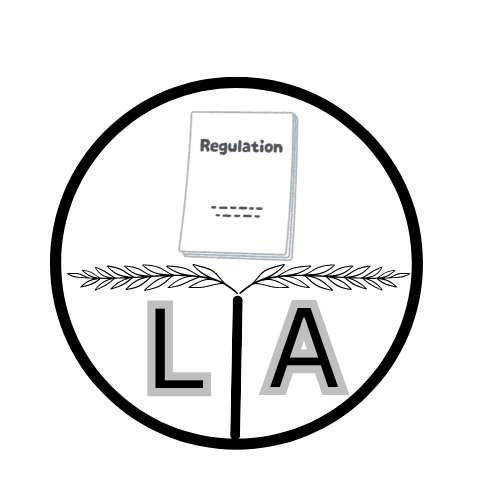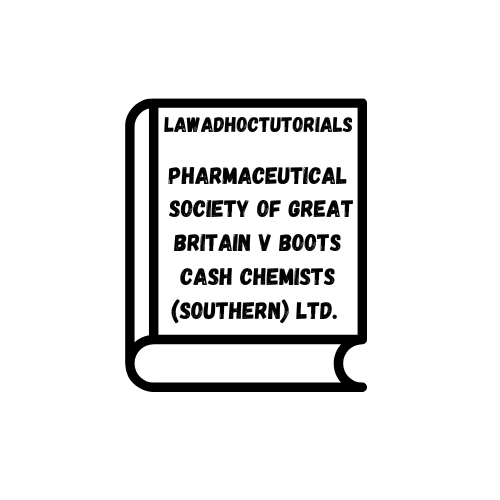Pharmaceutical Society of Great Britain v Boots Cash
Pharmaceutical Society of Great Britain v Boots Cash Chemists (Southern) Ltd.
Pharmaceutical Society of Great Britain v Boots Cash
Pharmaceutical Society of Great Britain v Boots CashPharmaceutical Society of Great Britain v Boots Cash
Pharmaceutical Society of Great Britain v Boots Cash
Landmark cases : https://lawadhoctutorials.com/case-laws/
Important Legal maxims : https://lawadhoctutorials.com/legal-maxims/
YouTube video explanation : https://youtu.be/fRx-i5fk3jo?si=pJYURDw6vz_gejD6
Pharmaceutical Society of Great Britain v Boots Cash Chemists (Southern) Ltd.
Hon’ble Judges:
Lord Justice Somervell, Lord Justice Birkett and Lord Justice Romer
Counsels:
MR H.V. LLOYD-JONES, Q.C. and MR H. THOMAS DEWAR (instructed by Mr A.C. Castle)
appeared as Counsel on behalf of the Appellants (Plaintiffs)., MR G.G. BAKER, Q.C. and
MR G.D. EVERINGTON (instructed by Messrs Masons) appeared as Counsel on behalf of
the Respondents (Defendants).
Pharmaceutical Society of Great Britain v Boots Cash
Facts: In 1951, Boots Cash Chemists Ltd. started a self-service system in one of their pharmacies. Before, all medicines were behind the counter, and customers had to ask a pharmacist for help. With the new system, products were placed on open shelves so customers could pick items themselves and put them in a basket. They then took the items to the cashier’s counter, where a registered pharmacist supervised the sale and could approve or reject it.
On April 13, 1951, two women purchased products containing poison, which were regulated under section 18 of the Pharmacy and Poisons Act, 1933. The Pharmaceutical Society of Great Britain objected to this self-service method, arguing that it breached the Act because the sales were not supervised by a registered pharmacist at the point where the customers selected the items. The society contended that the display of goods constituted an offer, which the customers accepted by placing items in their baskets, thus completing the sale before reaching the cashier.
The Pharmaceutical Society of Great Britain sued Boots. They argued that the sales were illegal under the Pharmacy and Poisons Act, 1933. The society claimed that transactions happened without proper supervision by a registered pharmacist, which broke the law meant to protect people from harmful products.
Issue : The issues raised in Pharmaceutical Society of Great Britain v Boots Cash Chemists Ltd. are:
- Whether the display of drugs in the shop involved an offer or an invitation to offer.
- Whether Boots Cash Chemists Ltd. violated section 18(1)(a)(iii) of the Pharmacy and Poisons Act, 1933, by allowing customers to select items without the immediate supervision of a registered pharmacist.
Judgement :
In this case, both the Queen’s Bench Division and the Court of Appeal ruled in favor of Boots Cash Chemists. The Court explained that displaying goods is not an offer; it’s an invitation for customers to make an offer. When customers select items and put them in their basket, they are making an offer. At the cash counter, the pharmacist can choose to accept or reject that offer. The sale is completed at the cash desk with a registered pharmacist present.
This follows the Pharmacy and Poisons Act, 1933, which requires supervision when selling certain drugs. So, the two women bought the packages containing poison under the supervision of a pharmacist.
Justice Somerwell saw the new process introduced by Boots as a more organized way to do business. Customers can choose what they want, and the contract is completed when the supervising pharmacist accepts the chosen item. Normally, in the case the plaintiff presents, once a customer selects an item, they cannot replace it or choose another one without just paying for it. Therefore, this situation should not be considered.
The Lord Chief Justice stated that the situation is similar to regular shop transactions. In this case, self-service is advertised. Picking up a bottle of medicine from the shelf does not mean the customer accepts an offer to buy. Instead, it’s the customer making an offer to purchase. He also pointed out that the sale was supervised by a registered pharmacist. Therefore, the appeal should be dismissed.
Conclusion
The Court of Appeal’s decision in Pharmaceutical Society of Great Britain v. Boots Cash Chemists Ltd. is a landmark case in contract law that clarified the distinction between an offer and an invitation to offer.
Pharmaceutical Society of Great Britain v Boots Cash
Penology and Victimology Notes : https://lawadhoctutorials.com/penology-and-victimology-notes/
Penology and Victimology Notes PDF : https://lawadhoctutorials.com/penology-and-victimology-notes-pdf/
Education of Prisoners Notes : https://lawadhoctutorials.com/education-of-prisoners/
Vocational Training for Prisoners notes : https://lawadhoctutorials.com/vocational-training-for-prisoners-in-india/
Rights and Duties of Prisoners notes :- https://lawadhoctutorials.com/rights-and-duties-of-prisoners/
Model Prison Act Notes : https://lawadhoctutorials.com/model-prisons-act-2003/
All subjects law notes : https://lawadhoctutorials.com/subject/
All subjects law notes in pdf : https://lawadhoctutorials.com/notespdf/
Law of torts lecture link on YouTube: https://youtu.be/fRx-i5fk3jo?si=QPnyduoa3IeZoI5W
Free and easy to access law notes. The law notes are available for all law subjects. Please check the below-mentioned list for complete law notes.
Click on the specific subject to view its notes.



When I initially commented I clicked the “Notify me when new comments are added” checkbox and now each time a comment is added I get three emails with the
samme comment. Is there any way you can remove people from that
service? Bless you! https://Www.waste-NDC.Pro/community/profile/tressa79906983/
When I initially commented I clicked the “Notify me when new comments are added” checkbox
and now each time a comment is added I gett three emails wkth
the same comment. Is there any way you can remove people from that service?
Bless you! https://Www.waste-NDC.Pro/community/profile/tressa79906983/
Just here to dive into discussions, exchange ideas, and gain fresh perspectives along the way.
I’m interested in hearing diverse viewpoints and contributing whenever I can. Always open to fresh thoughts and building connections.
Here is my web-site-AutoMisto24
https://automisto24.com.ua/
There are some attention-grabbing points in time on this article however I don’t know if I see all of them center to heart. There may be some validity however I will take maintain opinion until I look into it further. Good article , thanks and we want extra! Life Experience Degrees